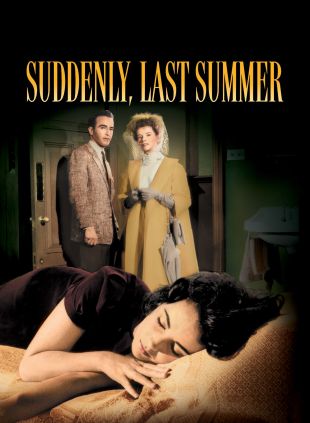
From its gothic settings to its potent female stars and its lurid subject manner, Suddenly, Last Summer presents a mixture of operatic Southern passions and high-camp excess unequaled in American cinema. The sight of Katherine Hepburn coyly descending from on high in an ornate elevator to preside grandly over her prehistoric garden is itself enough to scare away viewers looking for anything approaching quotidian naturalism. Audiences who can stomach Tennessee Williams and Gore Vidal at their most overheated, however, will be rewarded by a film rich in nuance, beautiful language, and vivid production details. Costume and set designer Oliver Messel takes the script's over-the-top vision and runs with it; unfortunately, the film's two primary settings -- a Grand Guigol mansion and an insane asylum presided over by vicious nuns -- lose their impact after so many scenes of arch dialogue. Luckily, director Joseph L. Mankiewicz works in a few set pieces involving rooms full of drooling lunatics and a memorable finale that superimposes impressionistic flashbacks across Elizabeth Taylor's haunted face. Taylor would bring Mankiewicz down with her during the Cleopatra debacle a few years later, but here the actress' overripe sensuality and neurotic shrillness are pitch-perfect; her gurgling screams at the climax of the film provoke the sort of chills of which few performers are capable. Hepburn's duplicitous matriarch isn't as nuanced as the morphine-addicted mother she would play in her next film, 1962's epic A Long Day's Journey Into Night, but it's certainly a lot more fun, full of biting humor and scathing psychological insight. As for Montgomery Clift, his booze-soaked solemnity imbues young Dr. Cukrowicz with an almost ancient gravity. Full of studio veterans exercising their craft on a larger-than-life script whose concessions to morality do little to dull its savage power, Suddenly, Last Summer comes off like the overgrown cousin of better-groomed, more celebrated Williams fare like The Glass Menagerie and A Streetcar Named Desire.
